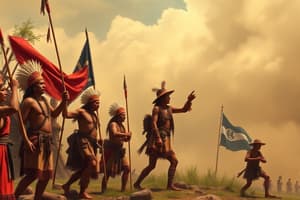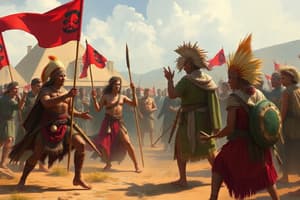Podcast
Questions and Answers
Explique cómo los líderes indígenas jugaron un papel crucial en las rebeliones indígenas.
Explique cómo los líderes indígenas jugaron un papel crucial en las rebeliones indígenas.
Los líderes indígenas desempeñaron roles vitales en la organización y dirección de las rebeliones indígenas. Tenían un profundo conocimiento de la tierra, las costumbres y las estrategias locales. A menudo se convirtieron en símbolos de resistencia y preservación cultural.
¿Cuáles fueron algunas de las causas principales de las rebeliones indígenas?
¿Cuáles fueron algunas de las causas principales de las rebeliones indígenas?
- Trabajo forzado e impuestos (correct)
- Despolización de tierras (correct)
- Enfermedades y desplazamiento (correct)
- Explotación de recursos (correct)
- Supresión cultural (correct)
- Opción política (correct)
Las rebeliones indígenas siempre resultaron en cambios políticos duraderos.
Las rebeliones indígenas siempre resultaron en cambios políticos duraderos.
False (B)
Describa cómo las rebeliones indígenas demostraron la resistencia de las comunidades indígenas.
Describa cómo las rebeliones indígenas demostraron la resistencia de las comunidades indígenas.
¿Cuáles son algunos de los ejemplos de consecuencias políticas de las rebeliones indígenas?
¿Cuáles son algunos de los ejemplos de consecuencias políticas de las rebeliones indígenas?
Explique qué pistas se pueden obtener de los relatos históricos sobre las rebeliones indígenas.
Explique qué pistas se pueden obtener de los relatos históricos sobre las rebeliones indígenas.
Las rebeliones indígenas siempre resultaron en una disminución de la cultura indígena.
Las rebeliones indígenas siempre resultaron en una disminución de la cultura indígena.
Explique la importancia de la historia de las rebeliones indígenas.
Explique la importancia de la historia de las rebeliones indígenas.
Flashcards
Rebeliones Indígenas
Rebeliones Indígenas
Diversas acciones de resistencia contra la colonización, la opresión y la explotación por parte de los pueblos indígenas a lo largo de la historia.
Líderes Indígenas
Líderes Indígenas
Individuos clave en la organización y dirección de rebeliones indígenas, con profundo conocimiento de sus tierras, costumbres y estrategias.
Explotación de Recursos
Explotación de Recursos
Abuso de los recursos indígenas sin compensación ni respeto por los derechos tradicionales.
Despojo de Tierras
Despojo de Tierras
Signup and view all the flashcards
Trabajo Forzoso y Tributos
Trabajo Forzoso y Tributos
Signup and view all the flashcards
Supresión Cultural
Supresión Cultural
Signup and view all the flashcards
Opresión Política
Opresión Política
Signup and view all the flashcards
Enfermedades y Desplazamiento
Enfermedades y Desplazamiento
Signup and view all the flashcards
Cambio Político
Cambio Político
Signup and view all the flashcards
Resistencia Indígena
Resistencia Indígena
Signup and view all the flashcards
Violencia y Pérdidas
Violencia y Pérdidas
Signup and view all the flashcards
Pérdida Cultural
Pérdida Cultural
Signup and view all the flashcards
Reconciliación e Inclusión
Reconciliación e Inclusión
Signup and view all the flashcards
Diversidad en las Rebeliones
Diversidad en las Rebeliones
Signup and view all the flashcards
Resistencia Localizada
Resistencia Localizada
Signup and view all the flashcards
Conflictos a Gran Escala
Conflictos a Gran Escala
Signup and view all the flashcards
Cuentas Históricas
Cuentas Históricas
Signup and view all the flashcards
Motivaciones de Resistencia
Motivaciones de Resistencia
Signup and view all the flashcards
Estrategias de Resistencia
Estrategias de Resistencia
Signup and view all the flashcards
Resistencia, indígenas
Resistencia, indígenas
Signup and view all the flashcards
Causas coloniales
Causas coloniales
Signup and view all the flashcards
Adaptación cultural
Adaptación cultural
Signup and view all the flashcards
Resistencia, Duradera
Resistencia, Duradera
Signup and view all the flashcards
Diversidad Regional
Diversidad Regional
Signup and view all the flashcards
Study Notes
Indigenous Rebellions
- Indigenous rebellions throughout history have been diverse in their causes, actors, and goals. They often involved resistance against colonization, oppression, and exploitation.
Indigenous Leaders
- Indigenous leaders played crucial roles in organizing and leading these rebellions. They often had deep knowledge of local land, customs, and strategies. These leaders often became symbols of resistance and cultural preservation. Famous examples vary greatly by region and time period.
Causes of Rebellions
- Exploitation of Resources: Colonizers often exploited indigenous resources without fair compensation or respect for traditional rights.
- Land Dispossession: Loss of land to colonizers through force, fraud, or imposed boundaries was a major cause of resentment and rebellion.
- Forced Labor and Taxation: Heavy taxation and forced labor extracted from indigenous communities, often beyond their capacity, frequently fueled rebellions.
- Cultural Suppression: Attempts to enforce foreign languages, religions, and customs on indigenous populations often created significant resistance.
- Political Oppression: Indigenous peoples, disenfranchised and marginalized, saw rebellions as tools to gain political autonomy.
- Disease and Displacement: Introductions of diseases and forced removals from traditional lands often significantly disrupted indigenous societies and fueled conflict.
Consequences of Rebellions
- Political Change: Some rebellions led to changes in colonial policies or governance structures, though often this was partial or short-lived.
- Indigenous Resilience: Rebellions demonstrated the resilience and determination of indigenous communities to maintain their identities and territories.
- Violence and Loss of Life: Rebellions frequently resulted in violence, displacement, and loss of life for both indigenous people and colonizers.
- Cultural Loss: Though indigenous communities show incredible resilience, some cultural practices and knowledge were sometimes lost due to violence and displacement. Other cultural practices were modified by colonizers' influence.
- Reconciliation and Acknowledgement: There may be efforts to reconcile with indigenous peoples and acknowledge their prior sovereignty in certain cases from decades or even centuries later.
History of Rebellions
- Rebellions have occurred throughout various historical periods across many cultures.
- The forms of resistance varied from localized uprisings to large-scale conflicts.
- Specific examples from history regarding these rebellions range highly depending on the region and time period.
- Historical accounts provide valuable insights into the motivations and strategies of rebellions. They also demonstrate the strength and resilience of indigenous communities.
- Some rebellions resulted in lasting changes to political landscapes and/or the treatment of indigenous peoples. This depended greatly on each instance's size, context, and location.
Studying That Suits You
Use AI to generate personalized quizzes and flashcards to suit your learning preferences.




